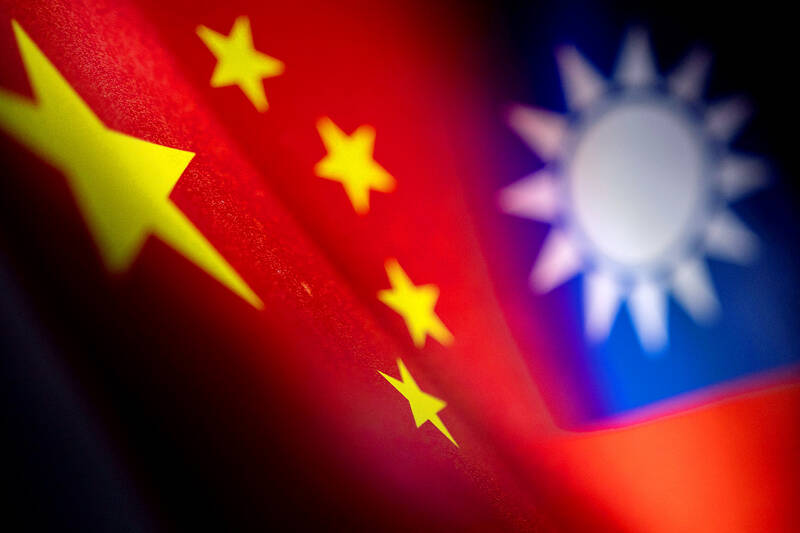More than 80 percent of Taiwanese oppose the “one China” principle and the so-called “1992 consensus,” a survey released yesterday by the Mainland Affairs Council (MAC) showed.
The council last week commissioned a poll to gauge public sentiment regarding comments made on Taiwan during the Chinese Communist Party’s (CCP) 20th National Congress.
Of the 1,096 respondents, 85.6 percent were “strongly opposed” to China’s refusal to renounce the use of force against Taiwan, MAC Deputy Minister Chiu Chui-cheng (邱垂正) told a regular news conference in Taipei.

Photo: Reuters
Meanwhile, 83.9 percent did not support the CCP’s “overall strategy for resolving the Taiwan issue,” while 82.3 percent disapproved of its “one China” principle and the “1992 consensus.”
The “1992 consensus” — a term that former MAC chairman Su Chi (蘇起) in 2006 admitted making up in 2000 — refers to a tacit understanding between the Chinese Nationalist Party (KMT) and the CCP that both sides of the Taiwan Strait acknowledge that there is “one China,” with each side having its own interpretation of what “China” means.
In addition, 79.3 percent disagreed that “peaceful unification under ‘one country, two systems’” is the best way to achieve cross-strait unification.
The results show that Taiwanese are resolutely opposed to political frameworks imposed by the CCP and its plan to find a conclusion to the Taiwan issue, with the public showing extreme disapproval for military intimidation, the council said.
Meanwhile, the survey showed strong popular support for the government’s cross-strait policy, it said.
Nearly 90 percent said they supported improvements to self-defense, while more than 80 percent approved of President Tsai Ing-wen’s (蔡英文) comments in her Double Ten National Day address that “armed confrontation is absolutely not an option for our two sides,” and that working together is possible on the basis of “rationality, equality and mutual respect.”
Additionally, 88.9 percent said they were willing to seek mutually acceptable ways of maintaining peace and stability on the basis of equality and mutual respect.
More than 80 percent supported adjustments to cross-strait exchanges considering cross-strait developments, as well as economic and COVID-19 considerations, while more than 70 percent supported tougher screening of Chinese traveling to Taiwan.
While 78.2 percent said that the CCP is unfriendly to the Taiwanese government, only 61.3 percent said it is unfriendly to Taiwanese.
About 86 percent supported “broadly maintaining the status quo,” while a similar 85 percent said that Taiwan’s future should be decided by its people.
Maintaining peace and stability across the Taiwan Strait is the responsibility of both sides, the council said, calling on Beijing to consider Taiwanese public opinion and current realities, abandon its aggressive mentality, and seek rational, respectful and pragmatic solutions.
The telephone survey, conducted from Wednesday last week to Sunday by National Chengchi University’s Election Study Center, surveyed people aged 20 or older. It had a margin of error of 2.96 percentage points.

Chinese Nationalist Party (KMT) Chairman Eric Chu (朱立倫), spokeswoman Yang Chih-yu (楊智伃) and Legislator Hsieh Lung-chieh (謝龍介) would be summoned by police for questioning for leading an illegal assembly on Thursday evening last week, Minister of the Interior Liu Shyh-fang (劉世芳) said today. The three KMT officials led an assembly outside the Taipei City Prosecutors’ Office, a restricted area where public assembly is not allowed, protesting the questioning of several KMT staff and searches of KMT headquarters and offices in a recall petition forgery case. Chu, Yang and Hsieh are all suspected of contravening the Assembly and Parade Act (集會遊行法) by holding

PRAISE: Japanese visitor Takashi Kubota said the Taiwanese temple architecture images showcased in the AI Art Gallery were the most impressive displays he saw Taiwan does not have an official pavilion at the World Expo in Osaka, Japan, because of its diplomatic predicament, but the government-backed Tech World pavilion is drawing interest with its unique recreations of works by Taiwanese artists. The pavilion features an artificial intelligence (AI)-based art gallery showcasing works of famous Taiwanese artists from the Japanese colonial period using innovative technologies. Among its main simulated displays are Eastern gouache paintings by Chen Chin (陳進), Lin Yu-shan (林玉山) and Kuo Hsueh-hu (郭雪湖), who were the three young Taiwanese painters selected for the East Asian Painting exhibition in 1927. Gouache is a water-based

Taiwan would welcome the return of Honduras as a diplomatic ally if its next president decides to make such a move, Minister of Foreign Affairs Lin Chia-lung (林佳龍) said yesterday. “Of course, we would welcome Honduras if they want to restore diplomatic ties with Taiwan after their elections,” Lin said at a meeting of the legislature’s Foreign Affairs and National Defense Committee, when asked to comment on statements made by two of the three Honduran presidential candidates during the presidential campaign in the Central American country. Taiwan is paying close attention to the region as a whole in the wake of a

OFF-TARGET: More than 30,000 participants were expected to take part in the Games next month, but only 6,550 foreign and 19,400 Taiwanese athletes have registered Taipei city councilors yesterday blasted the organizers of next month’s World Masters Games over sudden timetable and venue changes, which they said have caused thousands of participants to back out of the international sporting event, among other organizational issues. They also cited visa delays and political interference by China as reasons many foreign athletes are requesting refunds for the event, to be held from May 17 to 30. Jointly organized by the Taipei and New Taipei City governments, the games have been rocked by numerous controversies since preparations began in 2020. Taipei City Councilor Lin Yen-feng (林延鳳) said yesterday that new measures by